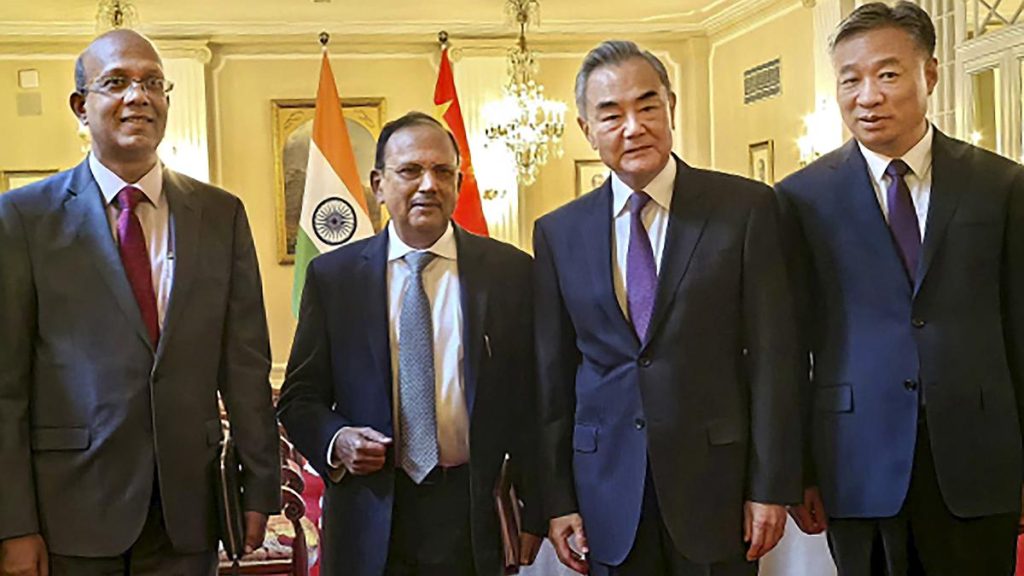
In an important diplomatic engagement, National Security Advisor Ajit Doval met with Chinese Foreign Minister Wang Yi on September 12, 2024, in St. Petersburg during the BRICS National Security Advisors (NSA) meeting. This high-stakes meeting came against the backdrop of ongoing tensions between India and China, particularly concerning the military standoff along the Line of Actual Control (LAC) in eastern Ladakh.
The meeting between Doval and Wang is significant as it represents a direct engagement between senior officials of two nations that have been embroiled in a tense border dispute since 2020. Both sides have recently engaged in a series of talks aimed at achieving disengagement of troops in contested areas, and this meeting was an opportunity to assess progress and outline the path forward.
The backdrop of this dialogue is further enriched by recent comments from External Affairs Minister S. Jaishankar, who stated in Geneva that approximately 75% of the disengagement issues between India and China have been resolved. Mr Jaishankar underscored that while there has been progress, the primary concern remains the increasing militarization along the LAC, which complicates the restoration of normalcy in bilateral relations.
Key Issues
During their meeting, Mr Doval and Mr Wang focused on several critical issues affecting the India-China relationship. The primary agenda was to discuss the ongoing military disengagement process, emphasizing the need for “urgency” and a commitment to “redouble efforts” to resolve the remaining friction points along the LAC. This urgency is particularly pertinent as both sides have seen progress in disengaging from areas such as Pangong Lake, Gogra, and Hot Springs, but continue to grapple with unresolved issues in Depsang and Demchok.
Mr Doval conveyed that peace and tranquility in border areas are essential for restoring normalcy in bilateral relations, reiterating that both nations must adhere to previous agreements and protocols established to manage border tensions. The discussion reflected a mutual recognition of the significance of stabilizing India-China relations not only for the two countries but also for regional and global stability.
Agenda for the Future
Looking ahead, the Doval-Wang meeting sets the stage for a possible summit between Prime Minister Narendra Modi and Chinese President Xi Jinping at the upcoming BRICS Summit in Kazan in October. This potential meeting could provide a crucial platform for both leaders to address bilateral issues directly and explore avenues for deeper cooperation. The meeting between Doval and Wang may have laid the groundwork for this potential dialogue, with both officials expressing a commitment to improving bilateral relations.
The emphasis on enhancing mutual understanding and trust, as highlighted by Mr Wang, points to a willingness to engage in pragmatic discussions to handle differences constructively. This approach is vital in navigating the complexities of the India-China relationship, especially in a turbulent global landscape.
(Kartike Garg contributed inputs for this article)
Author Profile
- India Writes Network (www.indiawrites.org) is an emerging think tank and a media-publishing company focused on international affairs & the India Story. Centre for Global India Insights is the research arm of India Writes Network. To subscribe to India and the World, write to editor@indiawrites.org. A venture of TGII Media Private Limited, a leading media, publishing and consultancy company, IWN has carved a niche for balanced and exhaustive reporting and analysis of international affairs. Eminent personalities, politicians, diplomats, authors, strategy gurus and news-makers have contributed to India Writes Network, as also “India and the World,” a magazine focused on global affairs.
Latest entries
 DiplomacyJanuary 5, 2026India walks diplomatic tightrope over US operation in Venezuela
DiplomacyJanuary 5, 2026India walks diplomatic tightrope over US operation in Venezuela India and the WorldNovember 26, 2025G20@20: Africa’s Moment – The Once and Future World Order
India and the WorldNovember 26, 2025G20@20: Africa’s Moment – The Once and Future World Order DiplomacyOctober 4, 2025UNGA Resolution 2758 Must Not Be Distorted, One-China Principle Brooks No Challenge
DiplomacyOctober 4, 2025UNGA Resolution 2758 Must Not Be Distorted, One-China Principle Brooks No Challenge India and the WorldJuly 26, 2025MPs, diplomats laud Operation Sindoor, call for national unity to combat Pakistan-sponsored terror
India and the WorldJuly 26, 2025MPs, diplomats laud Operation Sindoor, call for national unity to combat Pakistan-sponsored terror







